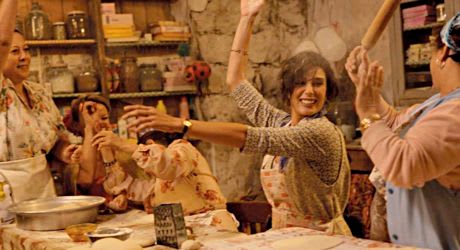Where Do We Go Now? may be a Lebanese film and it may concern itself with the type of contemporary religious conflicts often reserved for stories set in the Middle East, but its cinematic influences are overwhelmingly European. Specifically, it resembles provincial British comedies, such as The Full Monty or Waking Ned Devine in which disfranchised members of a community band together and form a plan that will provide them with material benefits and symbolically free them from oppression.
There's a disconnect, however, between the common element of oppression that brings the team together in Where Do We Go Now? and their goal. They are united by a common gender - they are all women, rendered powerless in a patriarchal community - but their goal is not to elevate the status of their gender. Instead, it is to prevent the further escalation of violence between Christian and Muslim men in their small Lebanese village.
The story begins with the assumption that men are proud, hot-tempered and violent, while women are vehicles of empathy, and although the intentions of director Nadine Labaki (who also writes and stars) are certainly noble, her film fails to move past these gender roles.
The plan formed by the women involves hiring tall, Ukrainian, exotic dancers to distract the men, essentially making them docile and preventing bloodshed by pandering to their libido. Despite its comedic moments, the tonally haphazard Where Do We Go Now? deals with heavy topics and Labaki tackles these with caricatures instead of complexity. The men are either angry or horny. The women are victims of male hubris or exotic dancers paid to be objectified in an effort to appease the male id and maintain peace.
The resolution of the film attempts to negate the importance of religious differences, but in doing so, the women are required to abandon their beliefs and traditions for the sake of peace between men.
Where Do We Go Now? contains moments worthy of enjoyment (although its humour is often built on these same tired gender differences), but in its simplicity, the film unfortunately endorses the role of women as subordinates, forced to sacrifice themselves for the well-being of men.
(Mongrel Media)There's a disconnect, however, between the common element of oppression that brings the team together in Where Do We Go Now? and their goal. They are united by a common gender - they are all women, rendered powerless in a patriarchal community - but their goal is not to elevate the status of their gender. Instead, it is to prevent the further escalation of violence between Christian and Muslim men in their small Lebanese village.
The story begins with the assumption that men are proud, hot-tempered and violent, while women are vehicles of empathy, and although the intentions of director Nadine Labaki (who also writes and stars) are certainly noble, her film fails to move past these gender roles.
The plan formed by the women involves hiring tall, Ukrainian, exotic dancers to distract the men, essentially making them docile and preventing bloodshed by pandering to their libido. Despite its comedic moments, the tonally haphazard Where Do We Go Now? deals with heavy topics and Labaki tackles these with caricatures instead of complexity. The men are either angry or horny. The women are victims of male hubris or exotic dancers paid to be objectified in an effort to appease the male id and maintain peace.
The resolution of the film attempts to negate the importance of religious differences, but in doing so, the women are required to abandon their beliefs and traditions for the sake of peace between men.
Where Do We Go Now? contains moments worthy of enjoyment (although its humour is often built on these same tired gender differences), but in its simplicity, the film unfortunately endorses the role of women as subordinates, forced to sacrifice themselves for the well-being of men.
